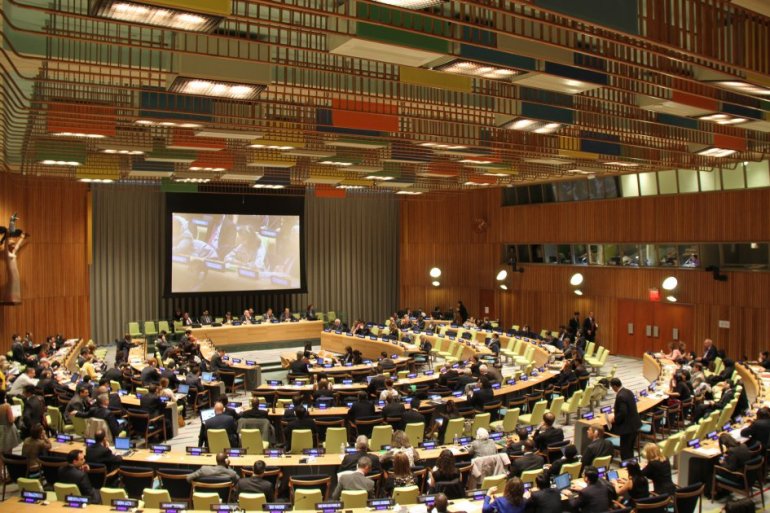NPT 2015 and 2010 Review Conferences
NPT 2015 and 2010 Review Conferences
The NPT 2015 Review Conference
The IXth Non-Proliferation Treaty (NPT) Review Conference took place from the 27th of April to the 22nd of May 2015 in New York City, under the chairmanship of the algerian ambassador, Mrs Taous Feroukhi.
After intensive dialogues, the conference was not able to agree on a consensus document. The polarization of the talks, sometimes offsetting the strategic context, and the disagreement on the issue of the Middle East weapons of mass destruction-free zone impeded a consensual outcome.
France is still fully engaged in favor of the implementation of the NPT in its three pillars.
During this conference, France recalled that the step by step approach to disarmament was the only one likely to produce concrete results. For this reason, the priority must be the entry into force of the Comprehensive nuclear-test ban treaty (CTBT) and the negotiation at the Conference on disarmament of a Fissile Material production for nuclear weapons Cut-off Treaty (FMCT). France insisted on the deterioration of the strategic context and the growing number of proliferation crises, which are of concerns to the international community. France recalled the necessity to take into account the security context and the centrality of the principle of undiminished security for all, Lastly, it recalled it is essential to promote the responsible development of nuclear energy for civil purposes.
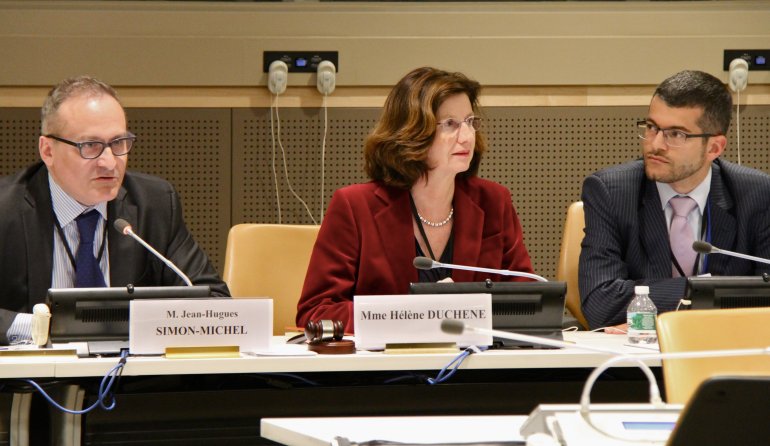
To ensure transparency, France organized in 2015 two visits for the representatives of 45 member States of the Conference on disarmament. The first was on the aerial base of Luxeil, on April the 16th of 2015. The second visit was at the Albion plateau on June the 18th of 2015, which used to be the ground-to-ground missiles site, and was disbanded since 1996.
**Preparatory Commitee 2014
The third Preparatory Committee (PrepCom) of the Nuclear Non-Proliferation Treaty (NPT) was held in New York on 28 April-9 May 2014 and chaired by the Peruvian Ambassador, Enrique Roman-Morey.
This Preparatory Committee, being the last meeting before the 2015 Review Conference, adopted 2015 Review Conference agenda and enable participants to carry out more in-depth discussions on all three pillars of the Treaty (disarmament, nuclear non-proliferation and peaceful uses of nuclear energy), as well as on issues related to the implementation of the Treaty (Middle East WMD free zone s and withdrawal from the Treaty (art X) in particular).
During this PrepCom, France handed out its national report prepared in response to actions 5, 20 and 21 of the action plan adopted by the NPT Review Conference in 2010, as well as an updated version of the document detailing the steps taken by France to implement the IAEA action plan on nuclear safety.
Moreover, in a side event to the Preparatory Committee, France signed the protocol to the Treaty creating a nuclear weapon free zone in Central Asia, along with the four other nuclear-weapon States.
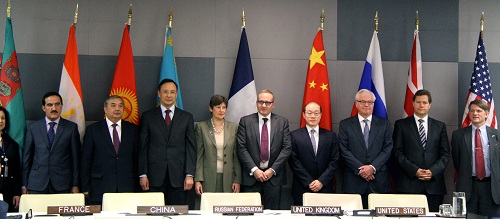
These were two major gestures that demonstrated the commitment of the nuclear-weapon States to push forward disarmament, in accordance with the article VI of the NPT.
**Preparatory Commitee 2013
The second Preparatory Committee of the Nuclear Non-Proliferation Treaty (NPT) was held in Geneva on 22 April-3 May 2013 and chaired by the Romanian Ambassador, Cornel Feruta.
In a context marked by a worrying aggravation of regional crises in both Iran and North Korea, the State parties recalled that the NPT today remains the cornerstone of the international non-proliferation regime and one of the foundations of the collective security. Consolidating this regime is one of France’s top priorities.
This Preparatory Committee allowed for in-depth, balanced discussions on all three pillars of the Treaty Only this balanced and realistic approach, calling upon States to carry out concrete, gradual actions, will set the conditions for a world without nuclear weapons, in accordance with the goals of the NPT.
Regarding the Middle East, the Preparatory Committee recalled the major expectations related to the implementation of the 1995 resolution and achieving the goal of a zone free of weapons of mass destruction in the region. That ambitious goal requires patience, perseverance and an inclusive approach.
**Preparatory Commitee 2012
Following the success of the 2010 NPT Review Conference, whichenabled for the first time the adoption by consensus of a concrete, balanced action plan on the three pillars of the Treaty (disarmament, nuclear non-proliferation and peaceful uses of nuclear energy), as well as on the issue of the Middle East, the new Review Cycle began in Vienna, with the first session of the Preparatory Committee on 30 April-11 May 2012, chaired by Ambassador Peter Woolcott of Australia.
The constructive atmosphere in which the debates took place enabled quick adoption of the rules of procedure by consensus. The Preparatory Committee confirmed the central role of the NPT as one of the foundations of our collective security
The Preparatory Committee witnessed substantial, balanced exchanges on the three pillars of the Treaty (disarmament, nuclear non-proliferation, promotion of civil uses of nuclear energy), including on essential issues that were insufficiently reflected in the 2010 final document, such as compliance with international non-proliferation obligations and withdrawal from the Treaty.
It reaffirmed the necessity to implement a WMD free zone in the Middle East, in accordance with the 1995 resolution
NPT 2010 Review Conference
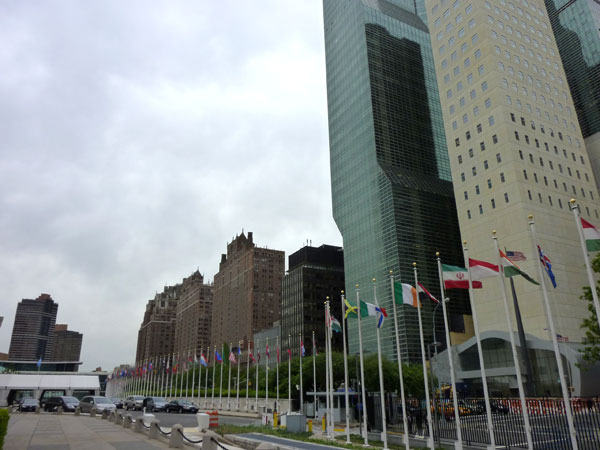
The 8th Non-Proliferation Treaty Review Conference took place in New York from the 3rd to the 28th May 2010, under the chairmanship of the Philippines Ambassador, Mr Libran N. Cabactulan. It came at a crucial time for the nuclear non-proliferation regime :
– with considerable challenges : persistent proliferation crises in Iran and North Korea ; risk of nuclear or radiological weapons or material falling into the hands of terrorists ; risk of a inadequate response from the international community to such challenges that undermine the non-proliferation regime and seriously threaten both international and regional security.
– but also many opportunities : opportunity for substantial progress in the area of disarmament, with prospects for a new agreement between the United States and Russia to reduce strategic offensive arsenals and new ratifications of the Comprehensive Nuclear Test-Ban Treaty (CTBT) 1, as well as the possible launch of negotiations for a new treaty banning the production of fissile material for nuclear weapons (Fissile Material Cut-Off Treaty). Hope that civil nuclear energy will help us meet the considerable energy needs in developing countries and make vital contributions to sustainable development and energy security.
For the first time, the States Parties to the Nuclear Non-Proliferation Treaty adopted by consensus an action plan with 64 concrete measures 2 on the Treaty’s three pillars (disarmament, nuclear non-proliferation and peaceful uses of nuclear energy). This positive result is likely to enhance our collective security and revitalize the NPT, which is the cornerstone of the nonproliferation regime.
For France, the NPT is above all a major instrument for collective security. It is in everyone’s interest to support it, preserve its integrity and strengthen it. Given the challenges the nuclear non-proliferation regime is faced with today, we need to work together towards a safer world so that we can accomplish all the Treaty’s objectives in order to reconcile security, stability and prosperity. This means implementing the three pillars of the Treaty : non-proliferation, disarmament and peaceful uses of nuclear energy.
Resolution 1887 3, unanimously adopted by the Security Council on 24 September 2009 at the level of Heads of State and Government, was a major step forward ahead of the Review Conference. It took stock of the major challenges that the nuclear non-proliferation regime is currently facing and provided an ambitious roadmap to address them.
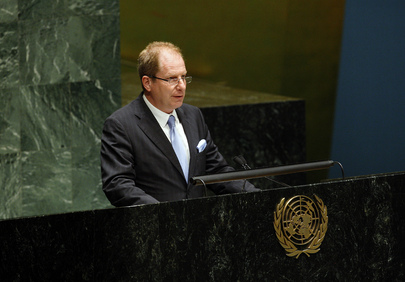
France committed fully to the success of the May 2010 Review Conference, which was an significant step forward in the international community’s efforts to strengthen the international nuclear non-proliferation regime and our collective security. The success of that Conference helped to consolidate the international community’s support for the NPT, in a context where the treaty is faced with a number of challenges.
France welcomes that the 2010 Review Conference succeeded to adopt an action plan containing concrete, realistic proposals on all three pillars of the Treaty (disarmament, nuclear non-proliferation, peaceful uses of nuclear energy).
As regards disarmament, the proposals are consistent with our desire to achieve concrete, realistic actions, as are the three priorities of the Cherbourg action plan proposed by the French President in March 2008 and the EU strategy against proliferation : pursuit of the US-Russia disarmament process, entry into force of the CTBT, negotiation of the Fissile Material Cut-Off Treaty (FMCT). They also highlight the importance of confidence and transparency, which we advocated. France does, however, regret that the action plan was not more ambitious, notably regarding the moratorium on the production of fissile material for weapons (already applied by four nuclear-weapon States)
Regarding nuclear proliferation, France would have preferred a more robust language . It also regrets that the significant issue of NPT withdrawal was not tackled. However, a very positive point is that the non-proliferation text urges all States that have not yet done so to sign an additional protocol 4. It also highlights the need for compliance with non-proliferation obligations and calls for a response in the event of failure to comply with IAEA safeguards agreements and for cooperation with the Agency.
The final document also includes several actions to promote the responsible development of civil nuclear energy, building upon the dedicated conference organized by France in Paris, in March 2010.
The adoption of a specific text on the Middle East, providing for concrete steps including a project for a Conference on the implementation of the 1995 resolution, initially scheduled for 2012, was a positive step.
Related Documents
French Statements and Papers
-
2010
- Statement in the General Debate (PDF 302.5 ko)
- Statement in the Main Committee I (PDF 529.7 ko)
- Statement in the Main Committee II (PDF 443.1 ko)
- Statement in the Main Committee III (PDF 499.1 ko)
- Statement at the Final Plenary Session (PDF 644 ko)
- Déclaration - bilan du Ministre des Affaires étrangères et européennes (PDF 52.3 ko)
2010 Working Papers
- France’s Action against Proliferation (PDF 237.5 ko)
- Nuclear Disarmament : France’s Concrete Commitment (PDF 229.4 ko)
- Nuclear Disarmement : Implementation by France of the “13 Practical Steps” (PDF 301.3 ko)
- Dismantling the Fissile Material Production Facilities for Nuclear Weapons (PDF 145.9 ko)
- Dismantling the Pacific Test Centre (PDF 143.5 ko)
- Dismantling the ground-to-ground component (PDF 161.7 ko)
- Supporting the beneficial, sustainable, safe and secure development of nuclear energy (PDF 25.6 ko)
- The responsible development of nuclear energy (PDF 171.7 ko)
- Middle East zone free of nuclear weapons as well as other weapons of mass destruction (PDF 162 ko)
2009 - Third Session of the Preparatory Committee for the Review Conference
- Statement in the General Debate (PDF 82.8 ko)
- Statement on Chapter 1 (PDF 89.4 ko)
- Statement on Chapter 2 (PDF 88.4 ko)
- Statement on Chapter 3 (PDF 93.5 ko)
- Working Paper "Nuclear disarmament : France’s practical commitment" (PDF 28.9 ko)
- Working Paper "Nuclear disarmament : a concrete step by France" (PDF 19.5 ko)
- Working Paper "Nuclear power development : meeting the world’s energy needs and fulfilling article IV"V (PDF 37.5 ko)
2008 - Second Session of the Preparatory Committee for the Review Conference
- Statement in the General Debate (PDF 552.3 ko)
- Statement on Chapter 1 (PDF 272.6 ko)
- Statement on Chapter 2 (PDF 77.1 ko)
- Statement on Chapter 3 (PDF 99 ko)
- Working paper : Nuclear power development (PDF 40.3 ko)
2007 - First Session of the Preparatory Committee for the Review Conference
European Union Statements and Papers
-
2010
- Common position of the European Union for the 2010 NPT Review Conference (PDF 738.8 ko)
- Débat général (en anglais) (PDF 1.3 Mo)
- Comité 1 (en anglais) (PDF 439.5 ko)
- Comité 2 (en anglais) (PDF 636.5 ko)
- Comité 3 (en anglais) (PDF 428.7 ko)
2010 (Working Papers)
- Strengthening International Atomic Energy Agency safeguards (PDF 23.7 ko)
- The capacity of the Comprehensive Nuclear-Test-Ban Treaty verification regime (PDF 22.8 ko)
- European Union international cooperation to support peaceful uses of nuclear energy (PDF 78.4 ko)
2009 - Third Session of the Preparatory Committee for the Review Conference
- Intervention au débat général (PDF 154.9 ko)
- Intervention sur le chapitre 1 (PDF 227 ko)
- Intervention sur le chapitre 2 (PDF 240.1 ko)
- Intervention sur le chapitre 3 (PDF 200 ko)
- Statement on the Middle East (PDF 134.6 ko)
- Statement on article X (PDF 63.9 ko)
- Document de travail sur le TICE (PDF 23.9 ko)
- Document de travail sur le Traité cut-off (PDF 21.5 ko)
- Document de travail : propositions de l’UE sur les trois piliers du TNP (PDF 24.5 ko)
2008 - Second Session of the Preparatory Committee for the Review Conference
- Intervention au débat général (PDF 439.5 ko)
- Intervention sur le chapitre 1 (PDF 223.6 ko)
- Intervention sur le chapitre 2 (PDF 338.7 ko)
- Intervention sur le chapitre 3 (PDF 208.5 ko)
- Statement on Withdrawal from the threaty (PDF 107.6 ko)
- Statement on the Middle East (PDF 114.5 ko)
- Working paper : Nuclear-Weapon-free Zone Treaties (PDF 247.5 ko)
2007 - First Session of the Preparatory Committee for the Review Conference
- Intervention au débat général (en anglais) (PDF 94.2 ko)
- Intervention sur le chapitre 1 (en anglais) (PDF 61.3 ko)
- Intervention sur le chapitre 2 (en anglais) (PDF 75 ko)
- Intervention sur le chapitre 3 (en anglais) (PDF 60.5 ko)
- Intervention sur le Moyen Orient (en anglais) (PDF 51.1 ko)
- Working Paper "Preparing for a successful Review Conference 2010" (PDF 32.4 ko)
- Working Paper "Export Controls" (PDF 18.4 ko)
- Working Paper "Fissile material cut-off treaty..." (PDF 17 ko)
- Working Paper "Nuclear Security" (PDF 18.8 ko)
- Working Paper "Multilateralization of the nuclear fuel cycle" (PDF 15.4 ko)
- Working Paper "Withdrawal from the NPT" (PDF 19.4 ko)
P5
-
2010
2009
2008
2010 NPT RevCon Documents
-
Final document
